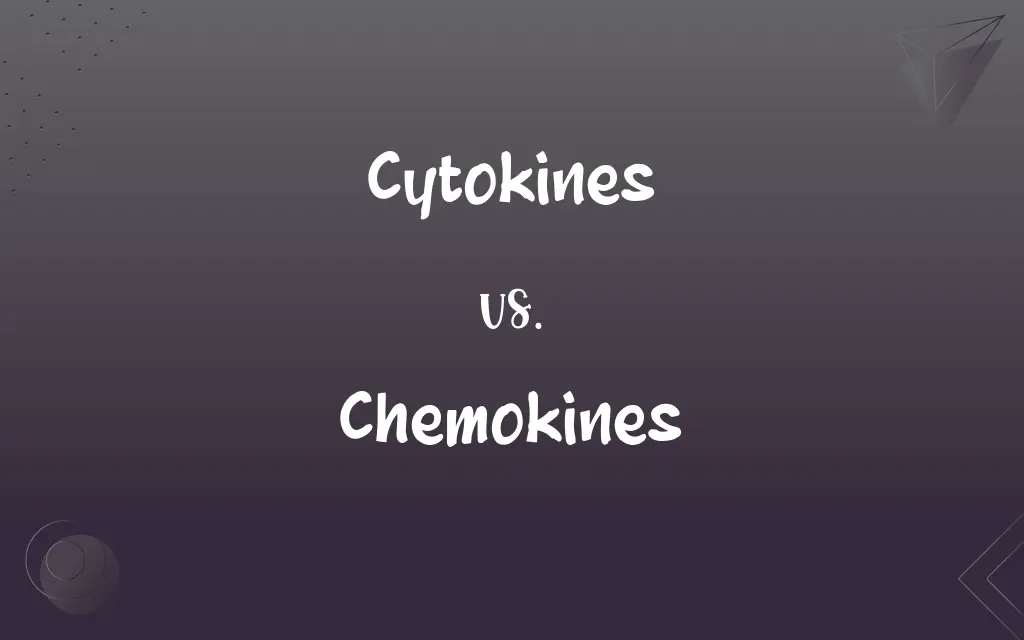Cytokines vs. Chemokines: What's the Difference?
Edited by Aimie Carlson || By Janet White || Published on December 17, 2023
Cytokines are a broad category of small proteins important in cell signaling, while chemokines are a specific type of cytokine primarily involved in attracting white blood cells to infection sites.

Key Differences
Cytokines are small proteins released by cells, particularly immune cells, which act as signaling molecules to regulate immunity, inflammation, and hematopoiesis. Chemokines, a subset of cytokines, are specifically responsible for chemotaxis, guiding the movement of immune cells towards sites of inflammation or infection.
The role of cytokines is diverse, encompassing the regulation of the immune system's response to disease and infection, as well as mediating normal cellular processes. Chemokines, on the other hand, primarily focus on directing cells, especially leukocytes, to areas where their services are needed in the immune response.
Cytokines include various types such as interferons, interleukins, and tumor necrosis factors, each with a specific function in immune response modulation. Chemokines are characterized by their ability to induce directed chemotaxis in nearby responsive cells, playing a crucial role in immune surveillance.
The action of cytokines can be either local or systemic, influencing not only the immune system but also other physiological processes. Chemokines typically exert more localized effects, creating chemical gradients that guide cells to specific locations.
Dysregulation of cytokine production can lead to a range of diseases, including autoimmune disorders, inflammations, and cancers. In contrast, chemokine dysregulation is primarily associated with pathological conditions related to immune cell migration, such as chronic inflammation and metastasis.
ADVERTISEMENT
Comparison Chart
Definition
Small proteins for cell signaling in immunity
Specific cytokines directing immune cell movement
Primary Function
Regulate immunity, inflammation, hematopoiesis
Induce chemotaxis in immune cells
Types
Interferons, interleukins, tumor necrosis factors
CXC, CC, C, CX3C chemokines
Scope of Action
Local and systemic effects
Primarily localized effects
Associated Diseases
Autoimmune disorders, cancers
Chronic inflammation, metastasis
ADVERTISEMENT
Cytokines and Chemokines Definitions
Cytokines
Proteins that act as immune system messengers.
Interleukin-1, a cytokine, plays a vital role in the inflammatory response.
Chemokines
A type of cytokine involved in directing the migration of immune cells.
Chemokines guide white blood cells to the site of an infection.
Cytokines
Substances secreted by certain immune cells to affect other cells.
The cytokine interferon helps protect cells against viruses.
Chemokines
Small signaling proteins that direct leukocyte movement.
Chemokines play a key role in the body's defense against bacterial infections.
Cytokines
Small proteins important in cell signaling, especially in immune responses.
Tumor necrosis factor, a type of cytokine, is involved in systemic inflammation.
Chemokines
Cytokines specifically responsible for chemotaxis in immune surveillance.
During an allergic reaction, chemokines mobilize cells to the affected area.
Cytokines
Messenger molecules that regulate the body's response to disease and infection.
Cytokines are crucial in orchestrating the body's response to vaccination.
Chemokines
Signaling proteins that control the movement and positioning of immune cells.
Chemokines are essential in the immune response to viral infections.
Cytokines
Cell-signaling protein molecules aiding in immune system regulation.
In autoimmune diseases, abnormal cytokine levels can cause excessive inflammation.
Chemokines
Molecules that create gradients to guide immune cells to inflammation sites.
Inflammation caused by injury is often mediated by the action of chemokines.
Cytokines
Any of various proteins, such as the interleukins and lymphokines, that are released by cells of the immune system and act in intercellular communication, especially in regulating inflammation and the immune response.
Chemokines
Any of various chemotactic cytokines that are released by several cell types and act to attract monocytes, neutrophils, and other white blood cells to sites of injury or inflammation.
Cytokines
Plural of cytokine
Chemokines
Plural of chemokine
FAQs
How are cytokines used in medicine?
They are used in treatments like immunotherapy for cancer.
What role do cytokines play in the body?
They regulate immunity, inflammation, and cell growth.
Can cytokines cause diseases?
Yes, dysregulation can lead to autoimmune disorders and cancers.
What are cytokines?
Small proteins important in immune system signaling.
How do chemokines function?
They create gradients to guide cells to infection or inflammation sites.
What are chemokines?
A type of cytokine that directs the movement of immune cells.
Are chemokines involved in allergies?
Yes, they mobilize immune cells during allergic reactions.
What is the difference between cytokines and chemokines?
Cytokines have a broad role in immune signaling, while chemokines specifically guide cell movement.
Are cytokines always beneficial?
Not always; overproduction can lead to harmful inflammation.
Do cytokines work systemically or locally?
They can have both local and systemic effects.
Can cytokine therapy have side effects?
Yes, like inflammation and flu-like symptoms.
Are cytokines involved in autoimmune diseases?
Yes, abnormal cytokine activity can contribute to these diseases.
Do chemokines play a role in cancer?
Yes, they can influence tumor growth and metastasis.
How are cytokines related to vaccines?
They are part of the immune response that vaccines aim to stimulate.
Can chemokines be targeted for disease treatment?
Yes, they are targets in therapies for diseases like rheumatoid arthritis.
Are all chemokines the same?
No, they vary in structure and function, classified into several types.
How do cytokines and chemokines interact with each other?
They work together to orchestrate immune responses and cell migration.
Can cytokines be measured to diagnose diseases?
Yes, cytokine levels can indicate inflammation or immune responses.
What triggers chemokine production?
Infection, injury, or immune responses can trigger it.
Can chemokines be artificially synthesized?
Yes, for research and therapeutic purposes.
About Author
Written by
Janet WhiteJanet White has been an esteemed writer and blogger for Difference Wiki. Holding a Master's degree in Science and Medical Journalism from the prestigious Boston University, she has consistently demonstrated her expertise and passion for her field. When she's not immersed in her work, Janet relishes her time exercising, delving into a good book, and cherishing moments with friends and family.
Edited by
Aimie CarlsonAimie Carlson, holding a master's degree in English literature, is a fervent English language enthusiast. She lends her writing talents to Difference Wiki, a prominent website that specializes in comparisons, offering readers insightful analyses that both captivate and inform.







































































